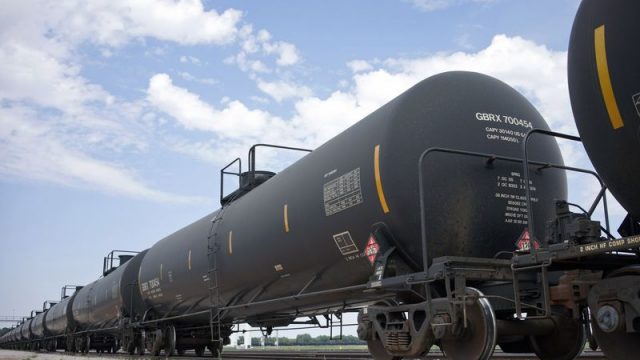The Question Of Bakken Crude's Volatility Must Be Settled

There is a sharp disagreement between the oil industry and the federal government over the volatility of Bakken crude oil.
This matters because, while more than 99 percent of hazardous rail shipments arrive at their destinations without incident, there have been high-profile derailments in places like Quebec and Casselton, North Dakota, that have resulted in major explosions. Given the volume of oil by rail shipments, and the number of times those shipments go through major populated areas, people are understandably concerned.
But the oil industry says the problem isn’t theirs. They say that Bakken crude is no more volatile than other substances shipped by rail (see: ethanol) and that oil is being unfairly singled out. By way of supporting this argument, the North Dakota Petroleum Council has produced a study from an independent firm. “All of this data does not support the speculation that Bakken crude is more volatile or flammable than other light, sweet crudes,” Kari Cutting, Vice President of the NDPC, said in their press release announcing the study.
Those findings were dismissed, though, by those who feel any study backed by the oil industry is going to produce the results the oil industry wants.
That skepticism is warranted, and certainly government reports have claimed the opposite, but it doesn’t necessarily dismiss the study’s findings either. What’s more, when high-ranking federal regulators were in the state last week to discuss oil by rail safety Governor Jack Dalrymple put them on the spot about the discrepancy between the oil industry’s study and the federal government’s own findings.
The answer given by the feds was something less than satisfying (emphasis mine):
U.S. Transportation Secretary Anthony Foxx said Friday that crude oil from North Dakota’s Bakken shale formation isn’t being singled out from other crudes in proposed new tank car standards, but he didn’t say definitively whether the Department of Transportation believes it’s more volatile than other light, sweet crudes.
“We’re seeing some light ends in the Bakken crude that suggests a higher level of volatility than we would see in typical crude,” Foxx said in a press conference after Friday’s meeting in Bismarck on national energy policy. “Of course, typical crude is a wide range of different, other types of crude.”
Earlier this week, industry representatives and members of the North Dakota Industrial Commission, including Gov. Jack Dalrymple, questioned why an analysis by the DOT’s Pipeline and Hazardous Materials Safety Administration singled out Bakken crude as being more volatile and riskier to transport than other U.S. crudes. A North Dakota Petroleum Council-commissioned study released Monday yielded similar data as the PHMSA study but found Bakken crude to be consistent with other types of light, sweet crude.
Dalrymple had said he planned to ask Foxx to explain, and the governor dove right into the topic when he took to the podium before Foxx during Friday’s Quadrennial Energy Review meeting at Bismarck State College.
“We are curious why the recent studies from the federal government have referred specifically to Bakken crude oil,” Dalrymple said to the crowd of more than 200 people at the National Energy Center of Excellence. “We think it’s important to classify crude oil by measurable characteristics” like vapor pressure and boiling point, “and not simply classify it by geographic source.”
So, this is a problem.
Governor Dalrymple’s office is saying that the North Dakota Industrial Commission (which regulates oil and gas development in the state and on which Dalrymple has a seat) will be holding a hearing to consider whether or not North Dakota producers should be required to stabilize oil before shipment.
But before the state goes there, shouldn’t we settle the question of volatility? As worrisome as the derailments in Casseelton, Quebec and elsewhere are, that’s not in and of itself enough to settle this question. After all, ethanol has also been known to explode upon derailment, yet regulators aren’t singling out shipments of that substance.
Both the NDPC study and the federal study used similar data to arrive at different conclusions. We need to know why that happened before we consider imposing sweeping new regulations on oil development in North Dakota which could change the shape of the state’s economy.




